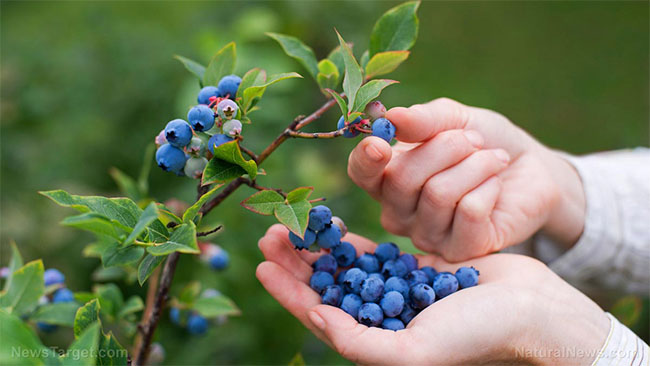by Evangelyn Rodríguez
05/21/2024 – Blueberries are currently in season, perfect timing for you to consider adding this superfruit to your daily diet.
According to a randomized controlled trial involving older adults, consuming 178 grams (around 75 to 80 pieces) of fresh wild blueberries every day can help you maintain healthy heart and brain functions.
Wild blueberries vs ordinary blueberries
While both are nutritious and rich in antioxidants, wild blueberries differ significantly in many aspects from cultivated blueberries. For one, wild blueberries are typically flash-frozen after being harvested and sorted. This ensures that the fruits retain their freshness, taste and vast nutrient content for longer periods.
Unlike ordinary blueberries, wild blueberries are gathered at the peak of their ripeness, which is why they need to be consumed immediately or otherwise frozen to maintain their freshness.
Cultivated blueberries, on the other hand, are picked before they are ripe, so they can survive months-long transportation without going bad. Organic growers choose to sell cultivated blueberries fresh instead of frozen. In fact, nearly half of all cultivated blueberries grown in farms are sold as fresh blueberries.
In case you are wondering, wild blueberries naturally grow on a desolate plain known as the Barrens of Maine. There, lowbush (wild) blueberries are the predominant shrub. While many blueberry barrens in the state remain untouched, some barrens in Downeast Maine are now actively managed by independent, family-owned growers.
Wild blueberries have a sweet, mildly tart taste and come in a variety of colors, such as pink, dark blue and light or dark purple. They are also said to have one of the highest concentrations of antioxidant polyphenols among plant-based foods.
Naturally low in sugar, wild lowbush blueberries contain 30 percent less sugar than cultivated highbush blueberries and boast a low glycemic index score of 53. Wild blueberries are also a rich source of manganese, an important mineral for blood sugar control. These qualities make wild blueberries an excellent fruit to snack on for people who need to watch their sugar intake.
Wild blueberries also contain 72 percent more fiber than cultivated blueberries because they have a higher skin-to-pulp ratio. Fiber-rich foods are good for the heart as they can help lower blood cholesterol. Fiber consumption also supports healthy digestion and regular bowel movements and even helps regulate blood sugar.
Wild blueberries for healthy heart and brain functions
Upgrading your diet with the addition of wild blueberries can do wonders for your body, especially since it can improve nutrition. And if that’s not enough to convince you, a recent study published in the American Journal of Clinical Nutrition reported that eating wild blueberries every day can help lower your blood pressure and enhance your brain function.
The aim of the study was to determine if the vascular and cognitive benefits associated with wild blueberries are linked to improved blood flow to the brain and blood vessel function. The researchers recruited 61 healthy adults aged 65 to 80 years and randomly gave them either a placebo or 26 grams (g) of freeze-dried wild blueberry powder containing approximately 302 milligrams (mg) of anthocyanins.
Anthocyanins are water-soluble plant pigments (polyphenols) that give many vegetables and fruits, including wild blueberries, their signature red, purple or blue color. Wild blueberries contain high amounts of anthocyanins, which have been shown to have antioxidant, anticancer, anti-diabetes, anti-obesity, neuroprotective and cardioprotective properties.
Blueberries are a potent superfood that offers many health benefits. Incorporate wild blueberries into your diet by adding them to nutritious smoothies, plain yogurt and salads; using them to make healthy desserts; making simple blueberry ice cubes; and sprinkling them on top of your favorite oatmeal or morning cereal. Food.news.



